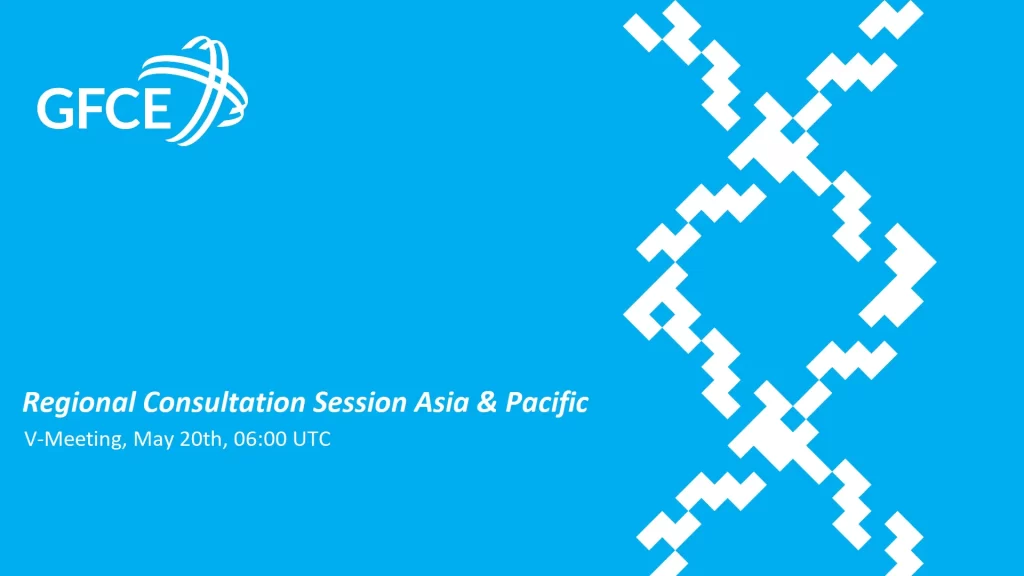Report | GFCE V-Meeting “Regional Consultation Session Asia & Pacific” | 20 May 2020
After the Americas Regional consultation session, the GFCE held the second consultation session, as part of the ongoing V-Meeting, regarding the Asia & Pacific region. Members and partners from the Asia & Pacific region were given the chance to discuss how their organizations/countries benefit from and contribute to the GFCE structures and processes. The aim of the session was to gather input from the participants for the next steps of the GFCE Way Forward 2022. For this reason, the session was divided into three different parts: individual, regional and global level.
Individual level
In the first part of the discussion, the participants shared their views on how their country/organization has benefited from the GFCE membership. By specifically highlighting the new evolving technologies and the current changes and demands in cyber capacity building due to the ongoing Covid-19 crisis, the participants pointed out the importance of the GFCE in bringing together, as a symbiotic organization, different stakeholders and help expand the information sharing. Focusing on the information and knowledge exchange, stakeholders not only with technical expertise but also with policy and legal background, come together to share experiences, identify gaps and weaknesses in CCB and collaborate on the way forward.
In addition, one of the most important aspects of the GFCE highlighted by the participants, is the opportunity that members and partners have, to connect with regional and global players on a neutral platform. This helps countries and organisations learn about projects and initiatives of other stakeholders, in order to bring this expertise into the national level, cooperate if possible, and avoid the duplication of efforts. Expertise and information exchange, coordination for development of online tools, exploring the cyber risks of emerging new technologies and raising awareness, were some of the key values that the GFCE is offering to its members and partners.
Regional level
The GFCE community was also asked to share its thoughts and ideas on what the Asia and Pacific regional cyber capacity needs are and what role the GFCE can play in addressing these needs. The participants specifically mentioned that the region has several sub-regional needs, projects and initiatives that need to be first taken into consideration before making assessments of what exactly the common regional cyber capacity building needs are. Understanding the needs and priorities of individual regional stakeholders, can create a common mechanism to target regional capacity building needs as effectively as possible. As highlighted, the GFCE can play an important coordination role to bring together the different actors within the Asia/Pacific region and create the appropriate mechanisms in order for regional players to share information and expertise openly with the GFCE Community. This can lead to the establishment of a regional hub for effective collaboration to address cyber capacity building needs and efforts.
One of the regional needs pointed out by the participants is the access to training for people involved in cyber capacity building methods and mechanisms. More specifically, members pointed out that since organising in person regional GFCE meetings are currently not possible due to the Covid-19 crisis globally, the GFCE should support the development of an online repository of training courses, which will be available to all members and partners within the GFCE Community. In this way, individuals involved in cyber capacity building will be able to get training from various global resources. However, the participants mentioned that it is important to first identify the specific regional differences in terms of cultural values, political and economic situation, legal frameworks or mandates, before moving into having a holistic training approach for cyber capacity building. By highlighting the importance of the GFCE in building a community of trust and open information exchange, the need for more pacific countries to join and get involved in the GFCE, together with experts, funders and implementers was specifically mentioned by the participants of the session.
Global level
As the GFCE has a strategic goal to become the global coordination platform for cyber capacity building, the community was also called upon to provide input on what role the GFCE should play on a global scale. The main feedback provided by the participants was that the GFCE should focus even more on how to bring the regional perspective into the global work of cyber capacity building. One important outcome raised, was the need to combine regional and global perspectives by coordinating ongoing projects and initiatives and support the information and expertise sharing globally. The GFCE should work on enhancing communication between regional and global players, encourage ongoing cooperation from all actors, create more research efforts on cross-cutting issues (such as the gender development on cyber space), and bridge the different perspectives on cyber capacity building.
The session concluded with Mr. Chris Painter, president of the GFCE Foundation Board, who welcomed all the different remarks raised by the participants of the session, and highlighted not only the need for even more regional inclusion from the Asia and Pacific in cyber capacity building mechanisms, but also the practical value of the GFCE in bringing together national, regional and global stakeholders from different sectors in order to share information and coordinate efforts.

